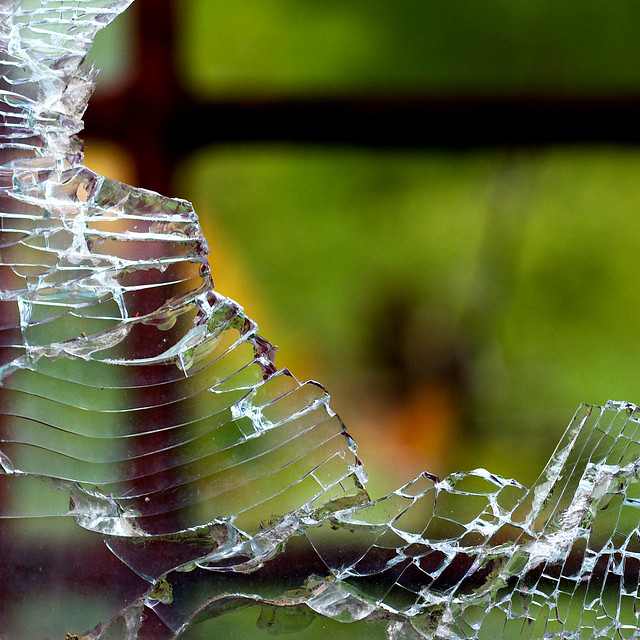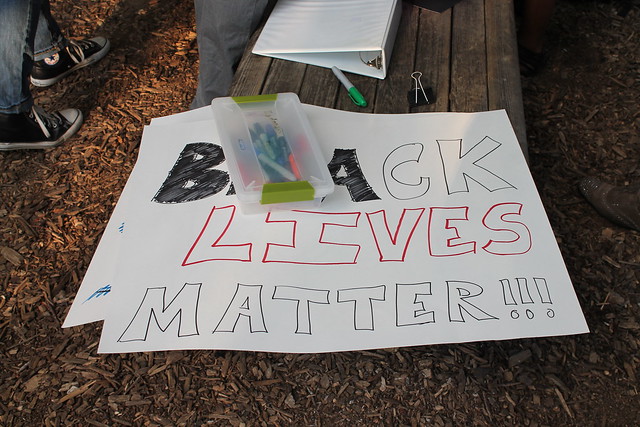
© 2013 Donnie Nunley, Flickr | CC-BY | via Wylio
When I was doing my research for A Year of Biblical Womanhood, I encountered the stay-at-home daughters movement within fundamentalist Christian circles. People often describe such staunchly patriarchal movements as "fringe," but what many fail to realize is that, though movements such as these certainly veer from the mainstream, they are immensely popular within certain subcultures, generate quite a bit of revenue and create their very own "celebrities," and have profoundly affected the lives of many thousands of women across the country.
So today I’m pleased to share with you an eye-opening and powerful guest post from Samantha Field. Samantha grew up in the Independent Fundamental Baptist movement and was deeply conservative until she started asking questions about faith and God and religion that her friends and professors couldn't answer. After three years as an agnostic theist, she eventually found her way back to Christianity; today she blogs about the intersection of theology and feminism, and works to educate young Christians about sexuality and consent.
***

My freshman year in high school, I mentioned my dream to become a marine botanist to my best friend, our pastor’s daughter, and she laughed.
“Don’t be ridiculous,” she said. “You can’t be a scientist. You have to be a keeper at home.”
Keeper at home.
It’s a phrase from the King James translation of Titus 2, and we interpreted it to mean that it was against God’s laws for women to be employed. Our church, however, took it one step further: if all a woman was allowed to be was a “keeper at home,” then it was utterly pointless for her to try to be anything else. Pursuing an education, or longing for a career could do nothing but harm her with shattered dreams. For that reason, young women in our church were asked to be “stay-at-home daughters.”
I gave up my dreams. I sacrificed them on the altar of biblical womanhood, fervently believing that the only way I could be blessed by God was to follow the clear guidelines laid out in Scripture. I was committed to remaining at home until I was married, when my father would transfer his ownership of me to my husband, giving me away at the altar with his blessing after a brief, paternally-guided courtship.
Occasionally, a snatch of a dream would intrude. No, Samantha. My inner voice would be harsh, echoing my Sunday school teachers and pastor’s wife. Do not be tempted. That’s just the Devil trying to trick you away from God’s plan. I looked to the other women in my life for inspiration—the other girls were filling their hope chests, meeting together to learn new recipes, learning to crochet and knit and sew.
I tried sewing. I almost broke my mother’s machine.
I learned how to crochet, but hated the feeling of yarn scraping around my fingers.
I took up cross stitching, but gave up when all I got was a snarl of silken tangles after weeks of trying.
I became a halfway-decent cook, but my heart was never in it.
As for cleaning-- I perniciously avoided laundry, dusting aggravated my allergies, dragging around the canister vacuum was torture, cleaning toilets made me gag, and dishes? Dear Lord, I hated anything having to do with dishes! Learning to enjoy housework, to “take pride in the homemaking arts,” was a complete and total bust.
The one thing I was good at was playing the piano. I’d started lessons when I was six, and was playing congregationally by thirteen. I devoted myself to becoming a pianist, and my mother joked that she couldn’t tear me away from the piano with a crowbar. They did everything they could to support my fanatical interest—buying a piano at a time when they could barely afford one and paying for lessons with the best piano teacher in three counties.
My senior year in high school, my piano instructor asked where I’d applied to college. When I told him I wasn’t going to college, he stared at me, dumbfounded, the lesson jerking to a dead stop. “What do you mean you’re not going to college?! Of course you’re going to college! Talent like yours can’t be hidden under a bushel.”
I haltingly tried to explain about being a stay-at-home-daughter, a keeper at home, but that just seemed to confuse him more, so he dropped it. I couldn’t stop thinking about his reaction, though. I knew he was a Christian, but he didn’t seem to have heard of being a stay-at-home daughter; while I knew our church was more conservative than most, I assumed that a concept as plain as “keeper at home” would be obvious no matter what church you went to.
The fact that it wasn’t clear to a person I respected, who I knew had a deep faith and was incredibly intelligent . . . bothered me.
It didn’t stop bothering me until I decided I was going to look into this. I typed “stay-at-home daughter” into Google, and found my way to a review of the documentary "Return of the Daughters," a film I’d seen and that was exalted by most of the women I knew. What I read gobsmacked me—in the review and the comments, hundreds of conservative Christian women lambasted the principles taught in the film, arguing against the Botkin’s narrow interpretation of Scripture. Arguing against my interpretation of Scripture.
I didn’t have to remain at home until I was married. I could go to college. It was too late for me to become an marine botanist, since I had abandoned any study of science or math in high school, but I could do something. I could get the piano performance degree my teacher was encouraging me to pursue.
As a compromise, I applied to a fundamentalist Christian liberal arts college not that far away from home. I should not have been surprised by the reaction I got when I announced my acceptance at church, but I was. I was hurt by their vindictiveness. I wasn’t ignoring what I’d been taught. I wasn’t selfishly chasing what my “deceitfully wicked heart” wanted. I just … wanted to study piano, to eventually become a housewife who taught piano lessons out of her living room. Was that so wrong?
I went anyway, ignoring the pleas of my best friend and nearly every woman I’d ever respected not to do something so totally opposed to “biblical teaching.”
I went, and I blossomed.
My sophomore year I decided to switch to a secondary education degree because I realized I didn’t want to spend my entire life at home. I wanted to be able to get a job. I spent the next few years fighting with nearly everyone back home about my decision, ignoring all the packets and booklets offering me more “biblical alternatives” like taking “at-home college-level courses in biblical homemaking.”
My senior year I completed a teaching internship and realized that I loathed almost everything about being a teacher. I woke up, brutally aware that I’d spent thousands of dollars and four and half years earning a degree that I’d never actually wanted, all because the people I’d grown up with had told me I couldn’t be anything else except a housewife who could use her teaching degree to homeschool her children.
So I found an English graduate program that would accept my credits and applied. When I told the people from my childhood who were still in my life, they tsked. One told me that she would be praying that I would be “led back to God’s true will for my life,” and that he would use my “errant heart to teach me his ways.” Another accused me of openly rebelling against God.
It hit me the hardest that my parents, who up until this point had fought for my right to go to college if I wanted, suddenly and inexplicably withdrew their support. When I showed my mother the university I wanted to attend, her only response was a solemn “you’ll need to ask your father.” My father’s answer was disheartening. He did not like the idea of me going to a college so far away from home, so far away from the “umbrella of his protection.” Why couldn’t I stay at home? Take online courses if I wanted a master’s degree? My attempts to explain online literature courses aren’t what I want were met with more reservations and protests. It wasn’t fitting for an unmarried daughter to live on her own.
I was accepted into the program, but they didn’t have any spots left to become a graduate assistant. Without any way to pay for it, I went home. I didn’t give up, though. I started taking online courses and began pocketing away all of the money I could—I would get to grad school, one way or another. Eight months later, the director of the GA program called me: a spot had opened up, was I interested?
So nervous I was sick, I called my father—and after eight months of him watching me work and save and study and read and write, he’d changed his mind. I wanted a master’s degree, and that was enough.
Graduate school was one of the hardest things I’ve ever done. Being thrown into an environment so different from what I’d known as a fundamentalist Christian was overwhelming at times, and I spent those two years catching up on everything I should have learned but never had the opportunity to.
In that time, my parents also left Christian fundamentalism and the stay-at-home movement—my mother even got a job, working “outside the home,” and she loves it. It’s been a bumpy road at times, but we’re the better for it, I think.
Today, when I hear stories about young women forgoing college in order to “serve their fathers” or “study to be a good wife,” my heart breaks. I had people in my life who pushed me into considering college, but not every stay-at-home daughter has that.
For most of my life I was utterly convinced that staying at home was what I wanted, a personal conviction that I had. It took me six years and two degrees in order for me to fully realize that it wasn’t something I ever would have chosen for myself if I’d been truly allowed to consider any other option.
Looking back at everything I went through, I realize now how important it is for women to be able to explore all of who they really are, to claim their spiritual gifts and God-given talents.
***
Be sure to check out Samantha's blog for more!























